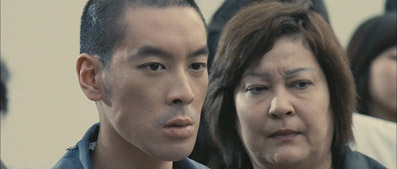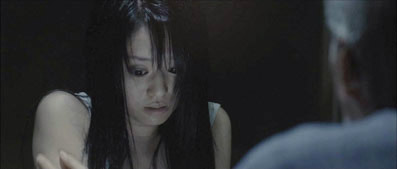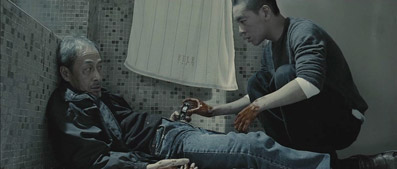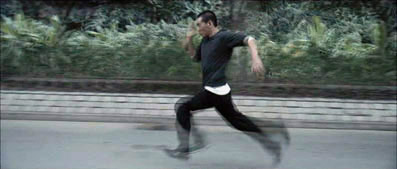|
There's something inherently dangerous about Korean revenge dramas. More so than their equivalent from just about any other country, they seem willing to take you to the darkest of places and show you sights you're not sure you're ready to see and deliver resolutions almost designed to wipe any trace of a smile from your previously happy face. If Wong Ching-po's Revenge: A Love Story [Fuk sau che chi sei] is anything to go by, it's a trait that has recently spread south to Hong Kong.
The first twenty minutes are a case in point. A heavily pregnant young woman walks into her apartment, and as she closes the front door she sees something that startles her. Later the same day, her husband arrives home, and as he calls for his wife he s assaulted by a crop-haired young man, who drags him to the floor and throttles him, a wide-eyed look of madness on his face. By the time the police arrive, the woman is dead and her unborn child has been cut from her body. But where is her husband? And just what is in that foul-smelling bag they fished from the bay? A short while later, a second pregnant woman is similarly mutilated, and the body of an old colleague of the investigating detectives is found drowned in boiling water in a bathtub in the adjacent room. A roadblock is set up and a man named Chan Kit (played by former pop idol Juno Mak), who we know is the killer, is chased down and arrested. He's then hauled back to the cop shop and angrily tortured, but he's not interested in talking – he's been framed by the police before, he tells them contemptuously. Elsewhere in the city, a third pregnant woman burns a picture of herself and Chan Kit, takes a knife from the kitchen and walks into the bathroom to...well, do you really need me to elaborate further?

That, I would imagine, will be enough to persuade a good many of you to give this particular film the widest of berths, and there's little point in me reassuring you that there's no on-screen horror because there most definitely is. We're spared the details of murders and mutilation but are repeatedly confronted with the grisly aftermath, and in the case of the third woman this involves more than just the wound she inflicts, if you get my drift. It's a similar story with the police interrogation of Kit, who is kicked to the floor, slammed face-down onto tabletop scattered with drawing pins, and has a metal spike wedged into his ear.
If you haven't tuned out yet then you may well be ready for where Wong takes us next, as in a reverse of the traditional genre timeline, he unexpectedly flips back to show us the events that led Kit to commit such horrifying crimes. With no caption announcing this temporal shift, it's left to us to realise that we've hopped back rather than forward in time, and that the Kit nervously selling buns to impatient locals and fixating on a backward schoolgirl named Cheung Wing (Japanese adult video actress Sola Aoi) is not one who has been released from police custody and planning his next kill, but the shy young man he was before yet-to-be-revealed events transformed him into a vicious killer. Given the severity of these later crimes, it may seem to be asking a lot of the audience to start sympathising with the verbal abuse he is subjected to and the doting fascination he develops for Wing. But when Wing is forcibly taken into care after her domineering grandmother dies, it's a genuinely caring Kit who effects her escape and takes her to a place where she can feel good about herself, even joining her in hilltop calls to her grandmother's spirit. When he accompanies her back to her grandmother's apartment, however, they are unable to gain entry, but are taken in by Wing's good-hearted prostitute neighbour Ling, who leaves them to freshen up to keep a date with a client. Still a little awkward with his equally innocent companion, particularly after catching a glimpse of her in the shower, Kit offers to nip down to his shop to prepare her a steamed bun, but while doing so is hassled by a drunk demanding a beer. A short while later this same man is at Ling's door aggressively in search of the service she offers.

What subsequently unfolds really should be left to the film to reveal, but in the spirit of that opening twenty minutes, it's a punishing ride, one that drags Kit and Wing through the sort of emotional, physical and moral nightmare that Korean cinema previously had something of a moratorium on. It's a journey with a specific narrative purpose, one that reverses the role of villain and avenger to provide a dark justification for the opening atrocities. By the time we return to the cell in which Kit is being tortured, our allegiance has shifted, and in spite of his actions the emotional money is now on him to be allowed to take his vengeance through to its ultimate conclusion.
As you have probably surmised, Revenge: A Love Story is not easy viewing, and our growing sympathy with Kit at times feels based more on what he and his new girlfriend go through than our engagement with him as a character. But as it becomes clear that the monster he will later be was created and unleashed by the very people who are now suffering at his hands, we're placed in a morally complex situation. Here the film asks us to sympathise with Kit's anger and actions through a process of situational empathy, one that taps into a base (male) desire for retribution, coupled with the revenge movie tradition that the punishment should always be disproportionate to the crime (a genre characteristic I recently touched on in my review of Rolling Thunder).
And on this level it works, in no small part due to director Wong's steely cool handling, which in some ways recalls the tone, pace and punishing content of Park Chan-wook's 2002 Sympathy for Mr. Vengeance, hence my comments above about the Korean connection. In common with the moral journeys undertaken in Park's celebrated Vengeance Trilogy, Kit's road to retribution is peppered with obstacles and unexpected turns, including one that requires him to confront the concept of forgiveness at its most creepily sanctimonious. It builds to an extraordinary climactic encounter in which the religious overtones of the chapter titles (which include the likes of "They saw the moment when God and The Devil shake hands") are given vivid thematic and visual representation, and Kit discovers that devotion of a different sort can also trigger a vengeful response in even the youngest of disciples.

While Revenge: A Love Story (and how apt that seemingly contradictory title is) will likely prove a little too tough for widespread appreciation, fans of recent Korean revenge drama, and particularly the gradual moral collapse of Sympathy for Mr. Vengeance, should find themselves on tonally and thematically solid ground. This is, it should be noted, no mere post-Vengeance Trilogy knock-off, but a thoughtful, precision-made and almost clinically observed story of injustice and the (self) destructive nature of anger and revenge. In common with so many of its genre brethren, it's also a very male story, one that casts women as victims who suffer grimly at the hands of men on both sides of the switching moral divide. It's an element that the film feels occasionally remiss in not more directly addressing, particularly the incident that first launches Kit on the rocky road to revenge, where those who commit the crime are given pause to question their actions not by what they do, but to whom they do it.
And it was all going so well. On the positive side, the image is clean, detailed, and at its best boasts a solid and well-balanced contrast range, which is pleasingly rendered on a medium sized CRT screen or PC monitor. But on a larger plasma or LCD, a number of problems caused by the NTSC to PAL conversion process are all too evident. Leading the pack are some major motion issues that are clearly visible on any substantial movement of camera or character – when Kit flees the police, there are times when he has the same number of limbs as a scuttling spider, and on the rare case when the camera tilts up or down the picture judders starkly. There are minor but visible jaggies on diagonal lines and some shimmering on horizontals and fine detail, and the contrast integrity varies quite a bit, though how much of this is down to post-production tinkering is, as ever, a difficult call. The toned-down colour scheme would appear to have been an artistic choice rather than a transfer issue – in the night-time mini-fairground sequence the colours are quite vivid.

When it comes to soundtracks, you can choose between Cantonese and Mandarin in Dolby 2.0 stereo, and a Cantonese-only 5.1 surround track (the film appears to have been shot in Cantonese and post-dubbed in Mandarin). Frankly, you can forget about the 5.1 track, which is not a legitimate surround mix but a straight AC3 recoding of the stereo track, one that has had the unfortunate effect of throwing most of the sound to the rear speakers, regardless of where the action is taking place. The stereo tracks are both clear and boast a strong dynamic range, so they should do fine.
Making-of (26:13)
A slightly more substantial making-of featurette than the EPK norm, consisting of the usual mixture on interviews and behind-the-scenes footage but divided into four thematically distinct chapters. In the first, director Wong Ching-po and lead actor Juno Mak – also the author of the original story – talk about the genesis and subsequent development of the film, while some of the other actors chip in about their characters. The second focuses on the physical stunts, and includes some on-set footage of leading man Mak being repeatedly thrown off a table, and some later pyrotechnics where he's set on fire. The preparation for a stunt that involves him being kicked in the chest is covered in some detail, but the first take reduces the entire room – Mak included – to gales of laughter. Chapter 3 focuses on the casting of popular Japanese adult video actress Sola Aoi, who was hired when it appeared that no Chinese actress was prepared to play such a role (you'll have to se the film to find out why). She spoke no Cantonese at the time of filming, so had to be coached on set before delivering her lines. The final chapter focuses on the make-up effects, particularly those involving the grislier visuals. Probably best not to watch this before the film.
Producer interview (6:14)
A Terracotta exclusive interview with the film's producer, Conroy Chan, co-founder (with his wife) of the Hong Kong production company 852 Films. Chan speaks in very clear Australian-accented English, and talks about making the move from acting to producing, the sort of films that his company is looking to produce (this is quite revealing), the casting of Sola Aoi, getting backing for such a dark tale, and the festival awards that the film has won. He also describes director Wong Ching-po as both extremely talented and "a sick motherfucker."
Also on board is a promo for the Terracotta Far East Film Festival and trailers for eight other Terracotta releases, including Yang Ik-june's excellent Breathless and Yim Pil-sung's wonderfully creepy Hansel & Gretel.
A tricky one. Tough going it may be, but Revenge: A Love Story is still a really well made and involving film that, in spite of its lack of real character depth, deserves to find an appreciative audiences alongside its more widely seen Korean stable-mates, but the standards conversion issues on Terracotta's DVD do get in the way and at their worst are quite distracting. If you're a devotee of the darker extremes of Far Eastern cinema then you may well be prepared to tolerate the glitches (and if it's the only way I could see the film, then I probably would, if a little unhappily), but if your budget is tight then you might want to rent before committing to buy.
|